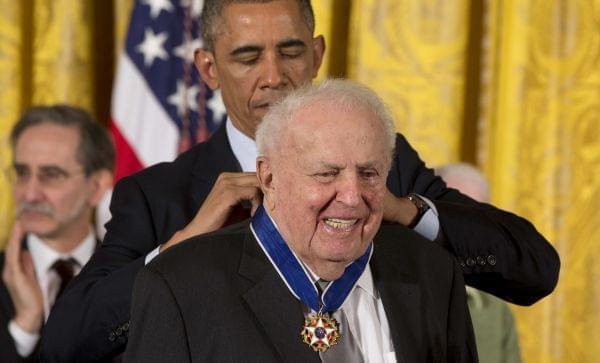Abner Mikva’s Memories Of Chicago Politics

Former Illinois Rep. Abner Miva receives the Presidential Medal of Freedom from President Barack Obama during a ceremony in the East Room of the White House in Washington in 2014. Mikva, a former congressman, Illinois legislator, federal appellate judge and presidential adviser, died July 4 at the age of 90. Jacquelyn Martin / AP
Stories about Abner Mikva, who died on Monday at age 90, have been circulating all week. He was a legend in Chicago and national politics.
A few years ago, Al Keefe, who was a s political reporter at public radio station WBEZ in Chicago at the time, sat down with Mikva for a long interview. All these stories are from that conversation.
The first is the most famous-- it’s an iconic story about Chicago politics. New in town, a law student, Mikva stopped by the local ward office to volunteer.
It was 1948, I had just started law school. And I was from Milwaukee, originally… but I was told that when I came to Chicago, I had to forget about politics, because this was a machine, a closed operation. And I accepted that.
… But Adlai Stevenson was running for governor and Paul Douglas was running for senator on the democratic ticket, and these were really very good candidates! And on the way home from law school every night, I’d pass the 8th Ward Regular Democratic headquarters: Timothy O’Sullivan, committeeman.
And I stopped in one night and said, “Hi, I’d like to volunteer for Stevenson and Douglas.”
And the quintessential ward committeeman took the cigar out of his mouth and said, “Who sent you, kid?”
And I said, “Well, nobody sent me.”
And he said, “Well, we don’t want nobody nobody sent.”
And that was the start of my career in politics.
Less well-known was Mikva’s encounter, a few years later, with the heart of machine politics, the patronage system.
That’s where government jobs went to good campaign workers-- who were “sponsored” by the local democratic committeeman.
This came after Mikva finished law school-- first in his class, editor of the law review-- and clerking for a U.S. Supreme Court Justice-- Sherman “Shay” Mitten.
When I finished my year, he said, “What are you planning on doing?”
I said, “Well, I’d like to go back to Chicago and work in the prosecutor’s office.”
He said, “Well, I can help there. Otto Kerner, Jr., is the U.S. Attorney, and his father and I were judges together.”
So he sat down and wrote a handwritten note. “Otto, this is a fine young man. You should take a look at him. Signed, Shay.”
I came back to Chicago, and went to the U.S. Attorney’s office and the note got me in to see Otto Kerner. And he reminisced for a few minute, about how he was a young boy when he first met Justice Mitten, and how Mitten and his father were such close friends.
Then he looked at the note again and said, “Who’s your sponsor?”
And this is the U.S. Attorney’s office. And I didn’t know how to answer! I said, “I guess, Justice Mitten.”
He said, “No, no no. Who’s your Committeeman?”
I said, “I don’t know...And I couldn’t tell him, and that was the end of my career as a prosecutor.
Mikva went back to politics.
He worked with political independents in Hyde Park and got himself elected as a state representative in 1956. Then, Congress, the appellate court, the White House.
He took pride in mentoring young people entering public life. Including Supreme Court Justice Elena Kagan, Supreme Court nominee Merrick Garland, Senator Dick Durbin, Chicago Mayor Rahm Emanuel….
However, there was one person for whom Mikva’s early attempts at mentorships seemed to fail: Barack Obama. When Obama graduated from law school, Mikva tried to recruit the young lawyer as a clerk. Obama turned him down, to pursue public office in Chicago.
MIKVA: I thought, ‘Boy he’s got a lot to learn. You don’t just move to Chicago and plant your flag and run.’
Well, four years later, I came back to Chicago and he was a member of the state senate. … And we became friends, and went to breakfast and lunch a lot. … He was anxious to move up the ladder and was thinking about running for Congress. And I must admit, I exercised very bad judgment and encouraged him to run against Bobby Rush. And he got creamed, as you remember.
Obama’s career recovered from that advice, as did their relationship. The President issued a statement after Mikva’s death saying, “I’ve lost a mentor and a friend.”
Al Keefe asked Abner Mikva how he’d like to be remembered.
MIKVA: I’d like to be most remembered for energizing kids to get involved in politics. My wife and I started the Mikva Challenge, which works with high school kids, getting them involved in politics and government. I’d like my legacy to be: ‘He made sure that somebody sent people.’
President Obama’s statement says, “We’re all better off because we were sent by Ab Mikva, and because Ab in turn sent us forward to do big things.”

